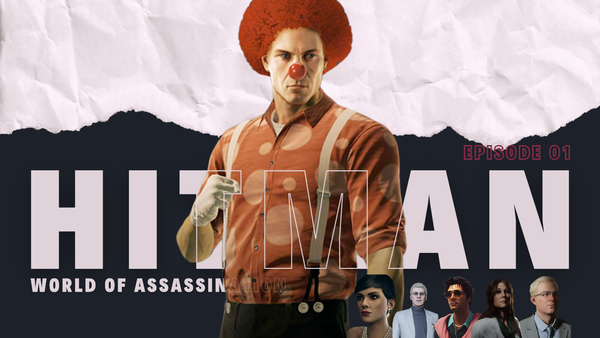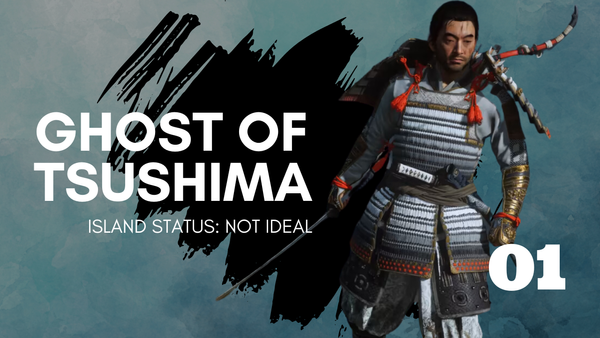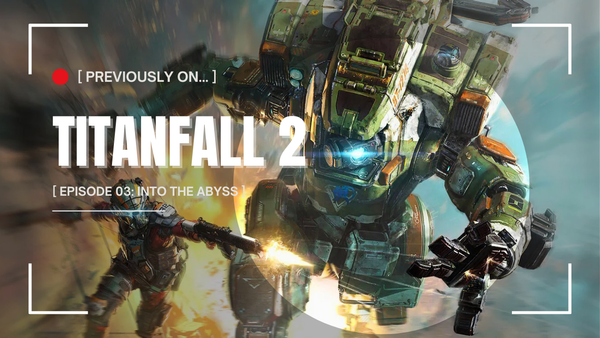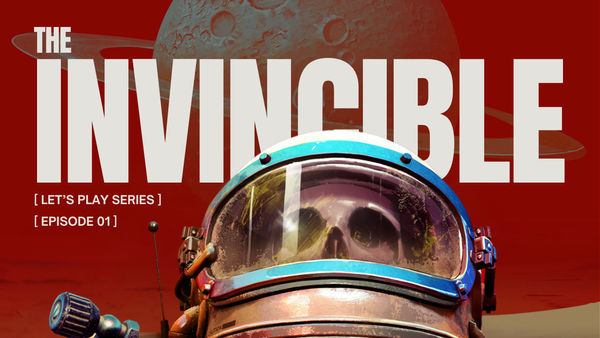007: NO TIME TO DIE | Review
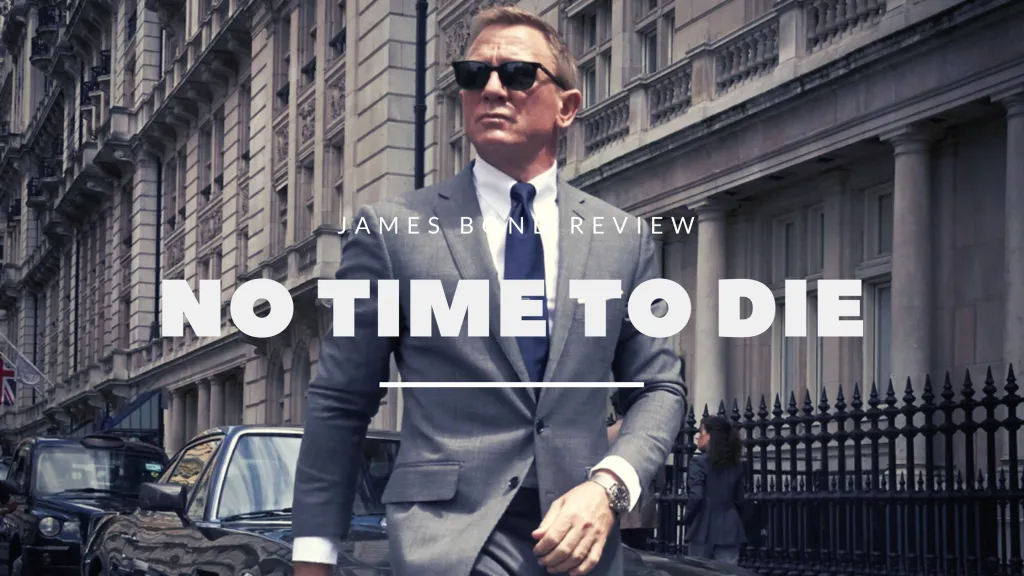
“There will be nothing left to save.”
In Daniel Craig's last movie as James Bond, the character earns an ending that is as fitting as it is final; while giving the franchise a push into a new direction.
A Man With One More Lesson Left To Learn, and Something To Lose
No Time To Die begins with ghosts from the past. Vesper — lesson learnt, the bitch is dead; that was James in Casino Royale. In Quantum of Solace, he refused to acknowledge that Vesper’s loss was a gaping void inside him, but it was clear to the audience. With Daniel Craig’s Bond, his days being a blunt instrument were numbered; and gone entirely were the days of glib, blasé quips. Connery, Moore and certainly Brosnan’s suaveness was entirely hollow; Craig played Bond more in line with Timothy Dalton, if one wanted to compare his approach to the role with any of the other actors’. Rough around the edges, and his humour stark and sardonic. He had wit; such as when he threw the gauntlet back at Silva with a disdainful, “Well, everybody needs a hobby.”
It’s not in the movie, but in the trailer, when Bond appears in his and Madeleine’s hotel room, blown literally half to hell, he says, “The past isn’t dead.” And I almost wish they’d used that line instead of “Letting go is hard;” although they roughly do the same job. It’s not that James was nearly killed: what triggers him is that it is once again Vesper being turned against him. His fury at Madeleine in that moment, his distrust, they don’t come from nearly being killed. It’s a trauma response to Vesper’s grave being desecrated to get to him. And even though it is a very simple bit of manipulation, it works. It works because that sting is set so deep in his heart it’s never coming out. Betrayal and inability to trust: unstoppable force meets immovable object. You can’t feel betrayal unless you trusted someone in the first place.
“You’ll never see me again.”
And when she put a hand on her stomach then, I knew.
So he makes the choice, either to never be able to fully trust Madeleine, to doubt her whenever another enemy might come after him, or for her to always be in danger because of him. He puts her to the test, and he believes her. But he still leaves her. That lesson he learnt from Vesper; and Blofeld’s manipulation did it. It’s where the song’s title song lyrics come in quite handy, even while the song is arguably more about Vesper than it is about Madeleine: Another lesson yet to learn/ That I’d fallen for a lie. In this case, Bond falling for Blofeld’s lie, leaving him miserable and alone, and learning that he made a mistake pushing Madeleine away; even though it was, in that moment, perhaps the only choice he could make. Perhaps. This old dog has one more new trick to learn.
Knowing now what they could have had… James Bond has always been impervious to regret. Be that collateral damage, losing friends and allies, he was made of teflon. Until now. We see him incredulously mouthing to himself, ‘My family?!’ As if he can’t quite believe it — and who could? With all the women he’s ever screwed, not a condom, diaphragm, or morning-after pill in sight, fatherhood was something carefully kept away from Bond. That would have suggested responsibility for his callous actions; and more importantly — emotional connection. Something the Bond canon has always carefully understood, and framed, as a weakness.
At the end of Craig’s run as 007, his emotions are his strength. There’s a great moment on the island when Madeleine and Bond are hurrying after Safin, and then they hear a sound: and both of them stop dead, look at each other and then turn to find Mathilde hiding under a table. It marks them both with that parental instinct.
James Bond’s a dad now. The script doesn’t go so far as to have him take to it like a duck to water, but he gets a functional breakfast going, so deal with it.
This man has no armour left. It was starkly obvious in Spectre whenever Bond shifted from man to hitman: Craig always understood his physicality, and although different training regimes have him looking quite distinct in each movie, those things never change. From his stance to the way he carries himself, those things are James Bond. And in No Time To Die, when he drops his shoulders and faces someone squarely, with his heart centre mass and an open target, that’s when the armour drops. He’s always dispensed with covers that were of no use. And with Madeleine, there’s no need for cover except for London. In Italy, he’s ready to tell her everything, to have that future with her. Same as with Vesper, there’s a woman he loves with even more secrets than the ones he carries. And again, the not knowing sent them down a dark path. He lost Vesper — and he was so angry at her — because she didn’t tell him the truth. When they are in Venice and he notices that she’s not wearing her necklace anymore, she says, “Sometimes the past can be forgotten.” This theme is echoed in the opening sequence with Madeleine. And what’s also echoed is that her mystery could get them both killed. He can’t protect them if he doesn’t know what’s going on. And he fears she might never trust him enough. But Madeleine must have already known that she’s with child, and adjusted accordingly. She wanted to tell him. She wanted that future, too.
Also, Madeleine never feels like a replacement Vesper. She’s her own creature. James simply has a type. Smart, and mysterious.
Choosing Death, Choosing Love
And in the end, he chooses death. He’d rather die than live a life without love. He’d rather die than worry about them — because the only way to keep them safe would have been to remain in quarantine for the rest of his life, lest even infinitesimal contact with a total stranger put them at risk somehow.
They’ve never killed him before. But this time, he went full hero. Before, he always got away, more or less scot-free. Not this time. This time, he had no escape route left to take, no way out. But he bloody did it anyway. And he used the time he had left to be happy, to get and give closure. To affirm to Madeleine one more time that he loved her, and in the same breath to free her from his legacy.
I knew I was in big trouble when James gathered himself at Vesper’s grave and told her that he missed her. It was that, even more so than his first whispered ‘Je t’aime’ with Madeleine, that told me that we might really come full circle. His burning note, ‘Forgive me,’ echoes Mathis’ last request: “Do we forgive each other? Forgive yourself.” For him to be able to say that, for the character to be allowed to have those feelings and actually express them… the closest we’d ever come before were Brosnan’s encounters with Alec Trevelyan, and to an extent Paris Carver in Tomorrow Never Dies and Elektra King in The World Is Not Enough. Moore’s Bond visited Tracy’s grave exactly once before she was never mentioned again, and here in No Time To Die, the references could not be clearer. “We/You have all the time in world,” and the end credits overlaid with that song. I wouldn’t even be surprised if that winding road were the same that Bond and Tracy were driving down after their wedding in On Her Majesty’s Secret Service. That shootout with Safin’s men: a gruesome mirror image of how Tracy died; only this time the windows are bulletproof. To a point.
Many reviews have mentioned the nods and references and callbacks; and there certainly are many, many Easter eggs. But the ones that ring the loudest are the ones that remind us that James Bond is a man with a beating human heart.
Cary Fukunaga, aside from making this movie visually stunning and a masterful piece of character direction, floored me a little bit when in a behind the scenes interview he actually used the words, “unprocessed trauma.” For one, that man has understood the assignment; and he spoke about how he really looked at all the things that Craig’s Bond had been through, and how those things would inform his choices and his self-expression. Used to be all anyone ever talked about was “Girls, Guns, Gadgets!” Not anymore.
This movie is a love story, too, and Bond is unequivocal in his feelings towards Madeleine. His declaration in Norway is heartrending and true and wonderful. It’s romance. It matters, and it’s real. On the island, his frank adoration is all that’s left of him. All the fight’s gone out. He doesn’t need to run anymore.
James & MI-6: Friends, Found Family, and Grief
Eve, Q, Tanner, and Mallory
It’s so important, and so justified for this movie to have this long a runtime — because it gives them the space and time to give the supporting cast extended scenes. To show their bonds, to show how important they are for Bond to be able to do his job. His actions impact the team, and he can’t save the world without them. Used to be we saw them for two minutes at the beginning and then James would do nearly everything on his own. Not so, anymore. He needs them, and they need him.
They love him. More than ever, this is a Bond movie about the character, about his relationships with others; and how each of them are affected. At the beginning of Skyfall, Mallory accuses Dench’s M of being “sentimental about him.” Look how far we’ve come. (There is more here, about Mallory’s colossal mistake and about how it doesn’t sit right with me to have him do this after how strongly opposed he was to the new security initiative in Spectre. But the plot has to come from somewhere, and sometimes the call has to come from inside the house.)
It’s important to show each of them after James’ death, too; both in the immediate aftermath, and for them to come together and raise a glass. Their bonds of respect are crucial: Mallory and Bond really go at it in this movie. James has argued with M before, in all incarnations, but never quite openly challenged a decision like this that didn’t have to do with his own grounding/suspension. But when Bond reveals that Leiter passed away, M’s demeanour changes instantly, he expresses respect to Leiter and his compassion for James’ loss. He knows how much Felix meant to Bond — and this shows to the audience that this is a well-known constant. Bond doesn’t hide much from them. He doesn’t hide much at all anymore.
It was heartbreaking to watch Q put the pieces together — Bond, Madeleine, Mathilde. He understood, and he was so, so sorry. In that conversation over comms, they weren’t 007 and Quartermaster, they were friends. I’m not sure whether he or the others were listening to James and Madeleine say goodbye, or whether Q patched them out, but it almost doesn’t matter. They all knew, by the end.
A Note About Q
Throughout his tenure, Craig worked to undercut the hypermasculinity that’s at the core of Bond: by making him by turns smooth and then vulnerable, making it clear that the suave callousness is the act, not the real man underneath.
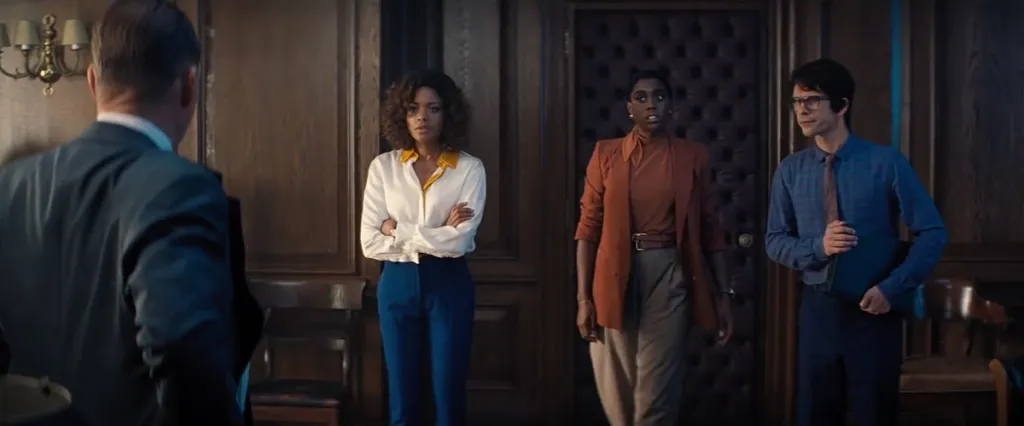
Q is now canonically gay, and somehow they managed not to do a Disney about it (twice!) by faffing off about how the Bond franchise is introducing their first LGBTQ+ character. Which would also be a plain lie, since the first was Pussy Galore in Goldfinger — only she was summarily turned around by Bond forcing himself on her and consent being a whisper on the wind when it came to Connery.
They’re not claiming it’s representation (because it isn’t), but it is handled well. In the scene with Q, Eve, and Bond, wherein they interrupt Q’s preparations for his date, Q drops the pronoun ‘he’ entirely casually. It goes unremarked upon, there’s no unnecessary reaction shot to Bond or Eve, no quip. Eve and James already know Q’s gay. That’s it, end of, everybody’s happy and it doesn’t suddenly affect Ben Whishaw’s stage directions.
And when Bond doesn’t have a place to stay because all his shit’s in storage again, he stays with Q. And no-one makes it weird. It’s just a thing that happens (the fandom cackling oh god, they were roommates aside) and with Mallory’s line, “I know he’s staying with you,” all the script does is re-establish in a few sleights of hand that Craig’s Bond is not threatened by queerness.
Craig revealed in an interview that the studio wanted to cut the “Silva Seduction” from Skyfall, but they fought to keep it; precisely because the way Craig and Bardem played it yanked it back from the brink of associating queerness with villainy at the last second. Silva is camp in that scene (and throughout the movie), and he toys with Bond, but it’s just a way of testing how to get under his skin. When it doesn’t work, he abandons the approach; and it’s not part of his villainy for the rest of the plot.
007: The Number, The Agents — Plural
I love Nomi, no holds barred. Lashana Lynch played her pitch perfectly, and she is a magnificent counterpoint to James in this script. His foil, to an extent, as she expects him to rankle at her having been assigned the number; only to realise that he truly has lost that elevator-filling ego. And while he puts on a good show, he offers the women in his life nothing but respect.
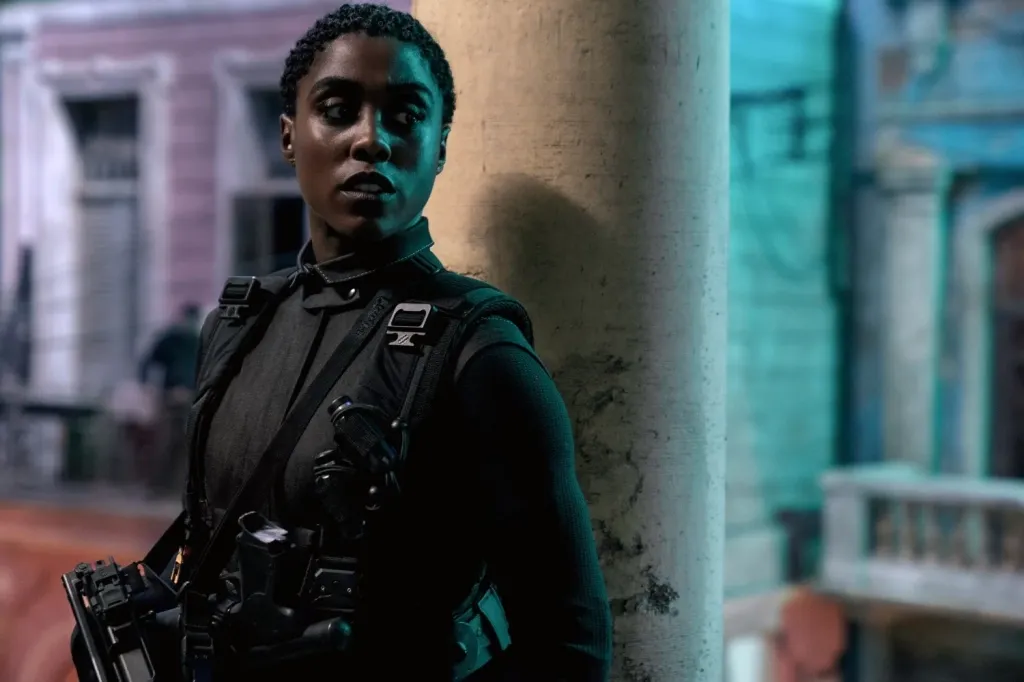
Having Nomi request that James be reinstated as 007 was a lovely touch, and it wasn’t out of exaggerated deference or intimidation; Bond certainly didn’t expect it. She simply felt that, as long as he was risking his life along with her, he deserved to have his old number back. After all, double 0’s don’t usually have a very long life expectancy. I’d expect that this would be the first time in recorded history that two agents holding the same number ever got to be in the same room together, on account of neither of them being six feet under just yet.
It is just a number — but it is also his entire life’s work.
Nomi’s demeanour, same as Mallory’s, changed the moment she realised what was at stake for Bond personally. Learning that Madeleine has a daughter, likely then putting two and two together. And then, Bond’s “Thank you, 007.” He makes it clear she owes him nothing; and that’s when she understands who he is. Much more than the reputation that precedes him. He doesn't win her over with charm, or sex, or violence. Simply by being a decent man.
You couldn’t replace any of these women with a lampshade.
The Women of No Time To Die
It is so, so crucial — and so obvious — that this script had a woman’s touch. Phoebe Waller-Bridge knows what she’s doing; her influence affords the female characters in No Time To Die time to shine, time to tussle with James, time to work with him, and time to love him. None of them are only one thing; each of them have facets and different sides to them that make them fleshed out, three-dimensional characters. You couldn’t replace any of these women with a lampshade.
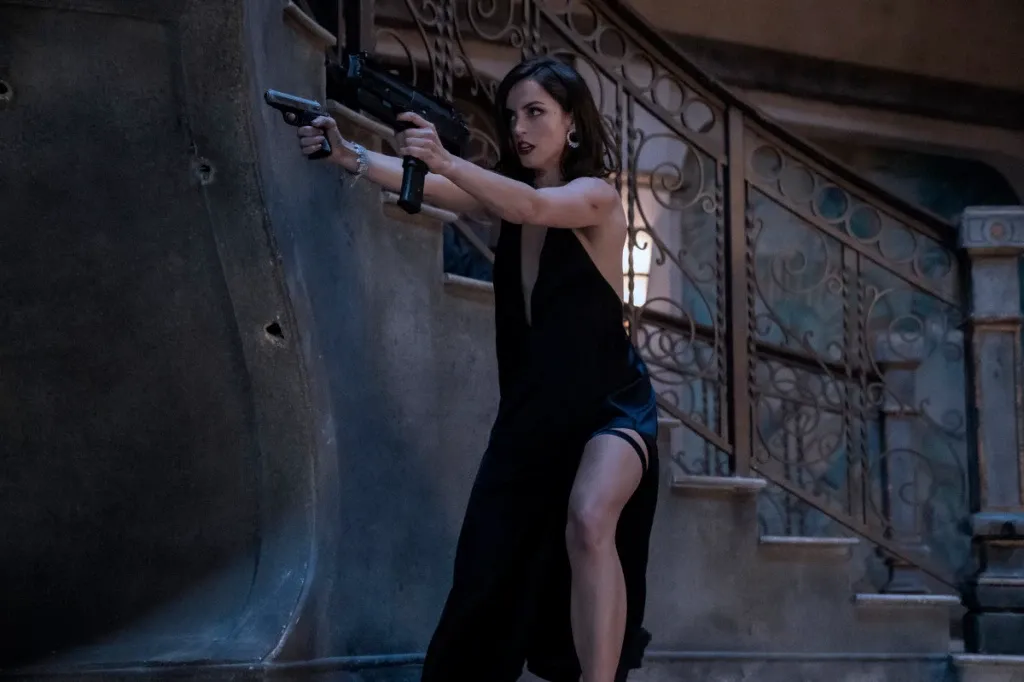
Paloma is a bit ditzy, but where she would have been played as a complete joke à la Mary Goodnight before, she absolutely kicked ass, all while maintaining her sunny personality. She's both. James is amused at her in the beginning, but walks into the field with her without condescension because he knows that the “three weeks’ training” of it all isn’t her fault. And then, he walks away nothing but impressed, and offers his sincere admiration and recognition of her abilities, not a backhanded compliment or a sleazy remark on her flexibility or some nonsense. She remains genuinely a sweetheart, wishing he could have stayed longer — but not in a seductive way. (Ana de Armas is everything and I love that even though her appearance is so brief, it’s memorable and it seemed they did it mainly because it was fun. And that somehow they gave her that dress and then left the male gaze at the door.)
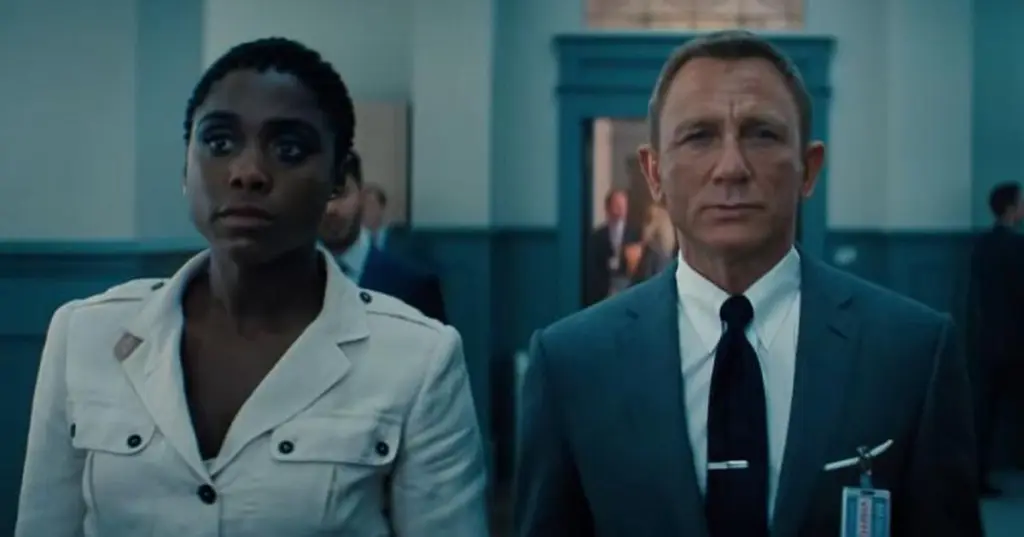
Nomi is no-nonsense and competitive — which tracks, given she is one of few Black women in a white male-dominated branch of Her Majesty’s Government. (Her presence also removes the sting of Eve becoming M’s assistant rather than returning to fieldwork after killing 007.) We know she had to work twice as hard to have half the recognition, so it makes sense for her to be on her guard around James. It’s entirely wise to anticipate the guy being precious at seeing her inherit his number. James, to his credit, doth not protest too much; knowing and understanding his word won’t mean much to her. Instead, he proves to her through his actions that he doesn’t have a problem, and it’s that which leads Nomi to request for him to have his number back, at least for that one mission.
Once they come to this understanding, we see Nomi’s companionable inter-office attitude — previously extended to Eve, Q, and Tanner — now also open up for James. They work together beautifully on the island, and she understands the magnitude of him trusting her with getting his family to safety.
The West Indies are a big part of Bond lore and backstory: Ian Fleming lived on Jamaica, his villa is literally called Goldeneye, and he got the name James Bond from a book about the birds of the region. (A book that Bond is reading in Die Another Day as an Easter egg.) Lashana Lynch herself has Jamaican roots, so for her this was about coming home, as well.
And there she is: 007 is now a Black woman. Deal with it. Cry, white fragility. Cry.
Cours, petit lapin, cours.
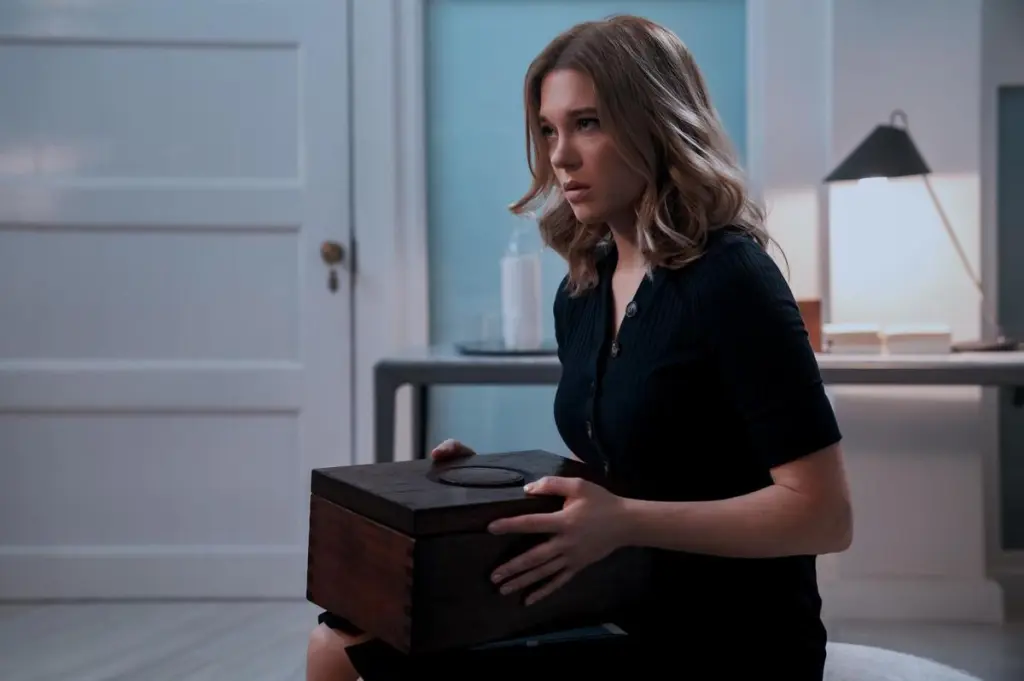
Madeleine is as mysterious as ever, characteristically competent with firearms, and a great mother. Neither of these things contradict each other, they are simply her facets; and her deadly instincts haven’t vanished with motherhood. (Crucially, however, the script doesn’t then tilt over into full lioness with her cub energy, not making being a parent her whole personality.) Her pain at losing James the way(s) she does is real, and she’s allowed to feel it.
And James Bond is allowed to carry a young child around — his daughter — and not lose an inch of his killing-machine-ness. He’s still who he is. He just also loves people, fiercely and unapologetically.
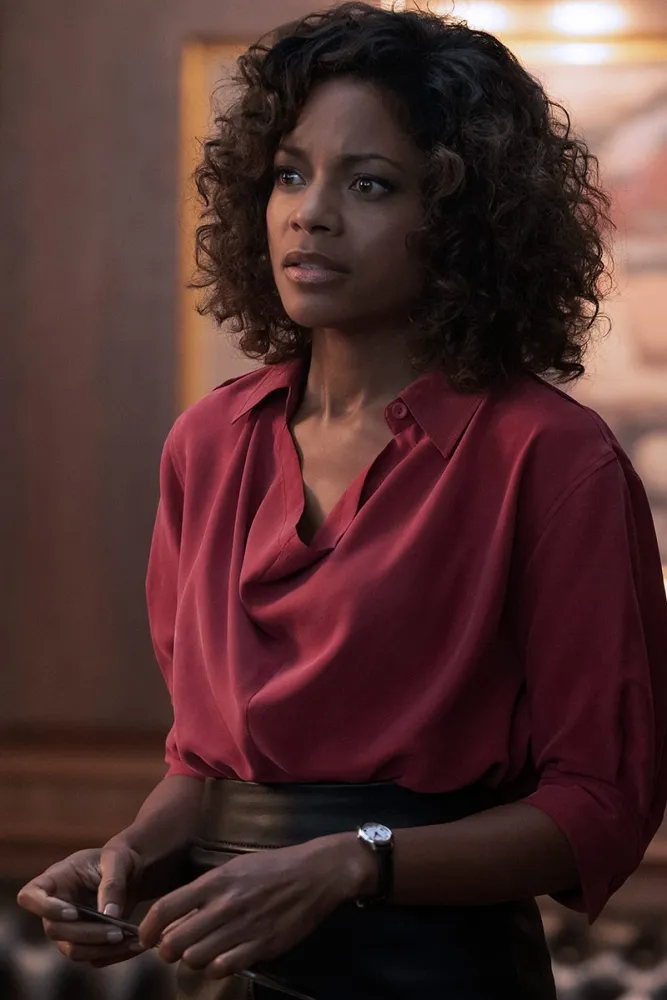
Eve, the one who knows him best and the one who approaches him to go behind Mallory’s back this time (who’s not even surprised, if a little ticked off), is allowed to cry at losing her friend. She doesn’t have to be stoic; nor does she weep like ye olde Moneypenny at Bond & Tracy’s wedding. I remember well that crack in her voice when she informed M and Tanner, “Agent down” in Skyfall. It finds its echo here.
A Note About Politics
While they’re in the minority, I’ve seen plenty of comments floating around the Internet complaining about all that “LGBTQ+ and the women,” about how “affirmative action has no place in Bond,” and how “girls, guns, gadgets!” isn’t the focus anymore. You know, all the people who personally knew Ian Fleming and just know that he would be spinning in his grave. It’s telling, then, that these commenters applaud each other for “having the balls” to say that — just to make sure that they can call any opposition to their outdated views and fake umbrage censorship and bullying from snowflakes. Along with all the ones still bloody complaining that Daniel Craig didn’t dye his hair and that he’s too short for the role (and that he’s not somehow a genetic splicing of Sean Connery and Pierce Brosnan, basically), it’s embarrassing to watch them dig their little holes.
“Affirmative action” of course is a direct dig at Nomi, and… just say you’re racist, buddy. Fewer syllables. (Additionally, if you didn’t cheer when Nomi kicked that scientist off the catwalk after he threatened to “exterminate [her] entire race,” then I don’t know what to tell you.)
Their favourite complaint is that Craig’s Bond has too much emotional depth because all the feelings distract from what Bond is really about — when his vulnerability here is, in fact, closest to the Bond in the novels. His nerves are constantly frayed, he thinks about quitting about every ten minutes, and he loves everyone he meets. Sound familiar? So when those people complain they want the “real” Bond back, they have absolutely no idea what they’re talking about. They’re clinging to their beacon of hollow hypermasculinity, and for what? Because it lets them feel superior? Or are they just allergic to genuine emotion in a man beyond, horny, drunk and checks notes explosives?
Girls, guns, gadgets… the 1960s called, they want their alliterated slogans and shitty views of women back.
And the changeover was slow: during the premieres to both Skyfall and Spectre, interviewers still asked mainly about the three big g’s, and it was the obvious answer when presented with the question, “What makes Bond so cool?” It took this movie taking its time to realise a full love story to get people to ask about the emotional core of Bond.
Frankly, I don’t ever want to go back to that Bond of yore. I am tired of calls for the “true” James Bond to come back — brunette, emotionally unavailable, and cracking wise. And it’s not just because of the misogyny — it’s because those movies were superficially thrilling and they had their moments, but ultimately they were entirely emotionally empty. Rewatching them feels unappealing, actually, aside from a few old favourites. But GoldenEye, for instance, is an old favourite of mine because he had feelings there, too. At least a few; for Alec and for the people around him. Queering Bond is no longer revolutionary, but it’s not a coincidence Bond/Trevelyan was the most popular 007 ship in the 90s, and continues to be written for. Xenia Onatopp definitely also awakened something in me, though I wouldn’t figure that out for about another 20 years.
Bond has changed, hopefully irrevocably. If you don’t like it, stop watching them; there’s plenty of emotionally hollow action movies out there, including a back catalogue of 20 emotionally hollow Bond movies. The rest of us are going to enjoy this one.
The Villain & This Doomsday Plot
As a friend of mine who’s a scientist credibly assures me, aside from a few bits of movie magic and That’s Not How This Works, the DNA-targeted carrier virus is a feasible evil plot. And yes, it’s absolutely terrifying. The plot is strong enough to raise the stakes to where they need to be; although the sheer bloody panic of the car chase in Norway doesn’t lie in what will happen if Safin wins. It lies in Bond doing all of this with a four-year-old in the backseat. I have never been so scared during a Bond car chase, that’s for sure.
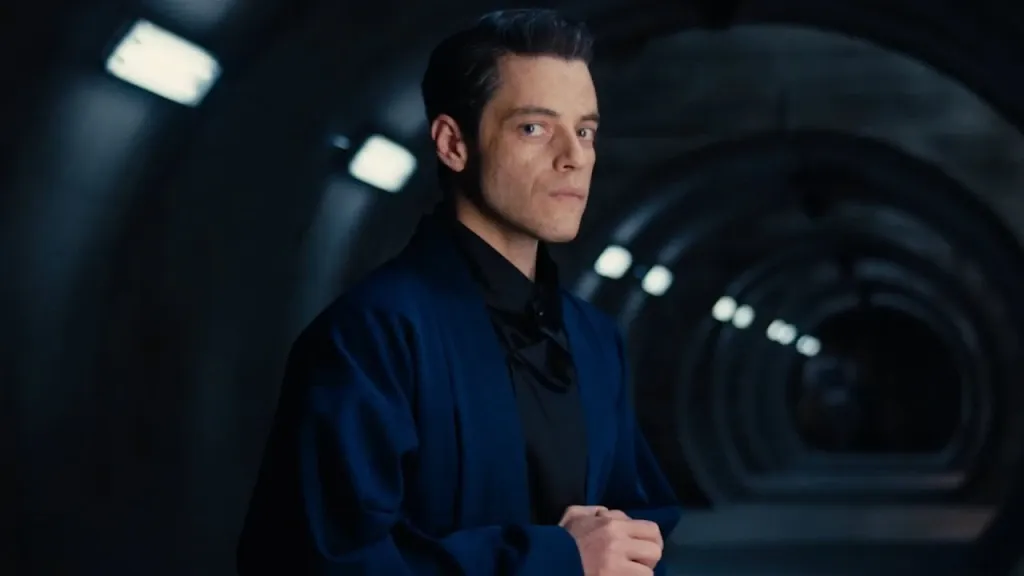
Safin’s motivation comes across a bit muddled, and while I think Malek Rami did a fantastic job with the role, the script did make him meander a bit; perhaps a little too much. But it’s interesting that Bond only gets two scenes with the villain of the day, both relatively brief compared to villain encounters in other movies. He meets him very late, as well — it’s because Safin comes from Madeleine’s past, and she’s the one he seeks out first. This is another way that the movie establishes Bond and Madeleine as partners, even as they aren’t together. To encounter one is to encounter both of them.
Malek delivers his Safin in the grand tradition of Dr No, in bearing, wardrobe, and aesthetic.
The Meta Level: What Happens When You Let The Audience Lose Someone They Love
I have never before cried at a Bond movie. Correction: I teared up when Vesper died, and when Mathis died, and when M died. Crucially: they all passed in James’ arms. And Craig’s Bond was allowed to cradle them, hold them, and comfort them. And this time, there was Felix — his brother. Screw Franz fucking Oberhauser, Felix was his brother. Fuck, Felix. He was so happy to see James again. At least he got his revenge on Ash. That Book of Mormon fucker.
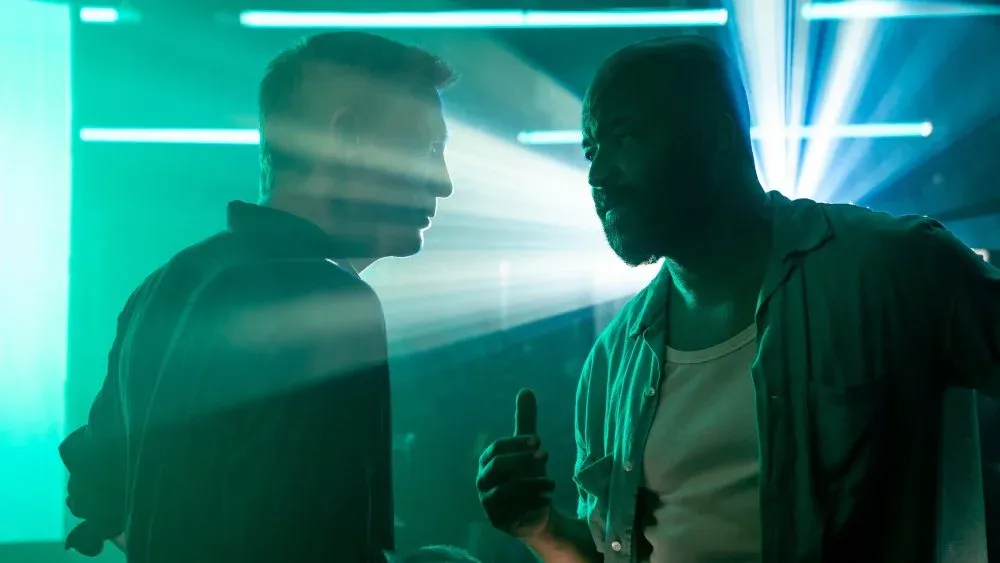
You can watch Connery and Moore’s movies in any order and the only thing that varies is their hairline.
But this time, we’ve also lost someone. It’s not like it used to be, where Bond movies had no plot connection, much less an emotional one. Each time, there was a reset, and it barely mattered when a new actor came in — of course, on the meta level, it mattered a lot. Each casting announcement was a huge deal, and bookies are running odds like nobody’s business on the next face even now. Getting a new Bond is like getting a new Doctor, and everyone hates change. But the movies refused to be bothered. Each time, even if audiences were upset, they were denied catharsis in the movies themselves; very much in contrast with the Doctor Who mechanism of regeneration and grief, mourning, and upset that follows. The Bond text refused to acknowledge anything outside of itself.
You can watch Connery and Moore’s movies in any order and the only thing that varies is their hairline. With each movie’s ending, it was virtually uncertain whether the actor would return. Craig’s frustration with the role aside, these movies needed him. He had to come back to tie up loose ends, and that (and I daresay a hefty chunk of money) may have been the main reason why he did come back after Spectre. Otherwise, the entire emotional arc would have fallen apart.
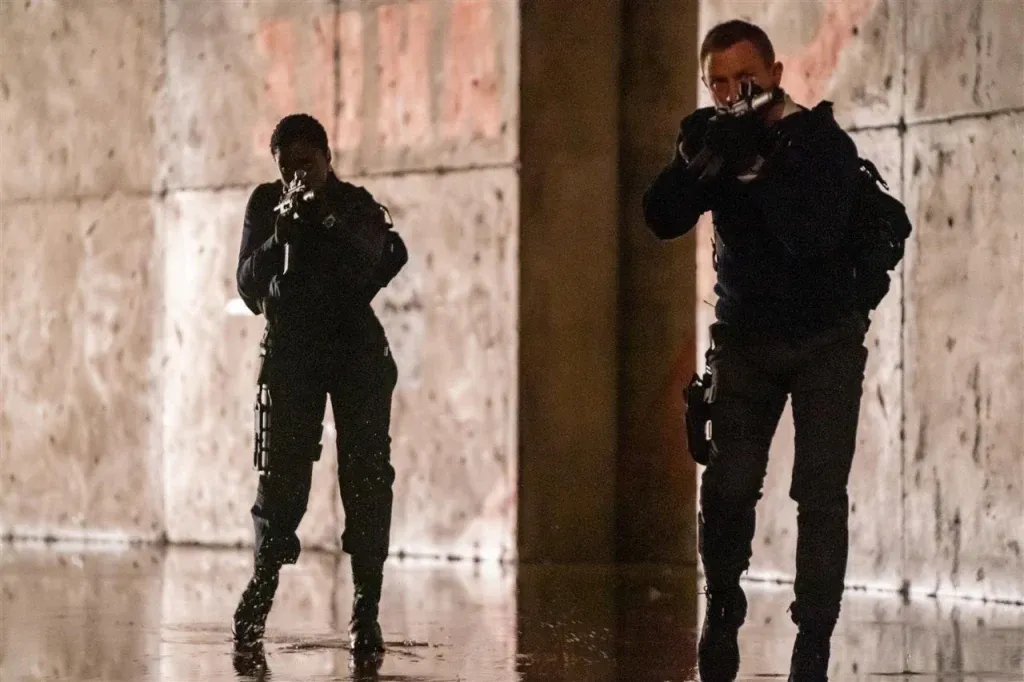
Fancy that, James Bond got an emotional arc. He got character development. Like I wrote in my Spectre review, it’s wild that suddenly here we’ve got movies that make more sense if you’ve watched them all, in conjunction and in the right order. The credit sequence takes cues from all of Craig’s movies, carrying visuals and themes with them. The card suit theme from Casino, the sand and water from Quantum and Skyfall; and more of the smoke and mirrors visuals from Spectre. The callbacks are more than fanservice (cough, Die Another Day, cough); they’re relevant to the plot. Or at the very least, they make a point. Only very few of them are purely gratuitous, and even those are subverted by Daniel Craig’s excellent comedic timing and propensity to very much let Bond express the ‘What the fuck just happened? Q? What the hell?’ with his wonderfully expressive face.
“Oh? Another child?”
James, please, I beg of you. Stop. I’m trying to be sad about your face.
And we lost James in more ways than one. We lost Daniel Craig as Bond, who put so much work into reinventing and subverting the character, the walking cliché, for fifteen years. I was in school when he got cast; he was 007 for nearly half my life. The blunt instrument, half-monk, half-hitman. We’ve seen the character evolve from all that, all of his decisions being informed by his past, and new decisions informing the future. A man allowed his trauma and his grief and inner conflict. His conversation with Madeleine on that train in Morocco in Spectre was such a mirror image of his first encounter with Vesper. Again, about the inevitability of soul destruction; about the toll that his work takes and why he then still continues to do it.
There’s a cliché in the solution being the love of a woman, but it worked with this Bond because he was always an orphan. No connection, nothing to lose. Definitely maladjusted. And, I think, always so openly and hungrily yearning for approval.
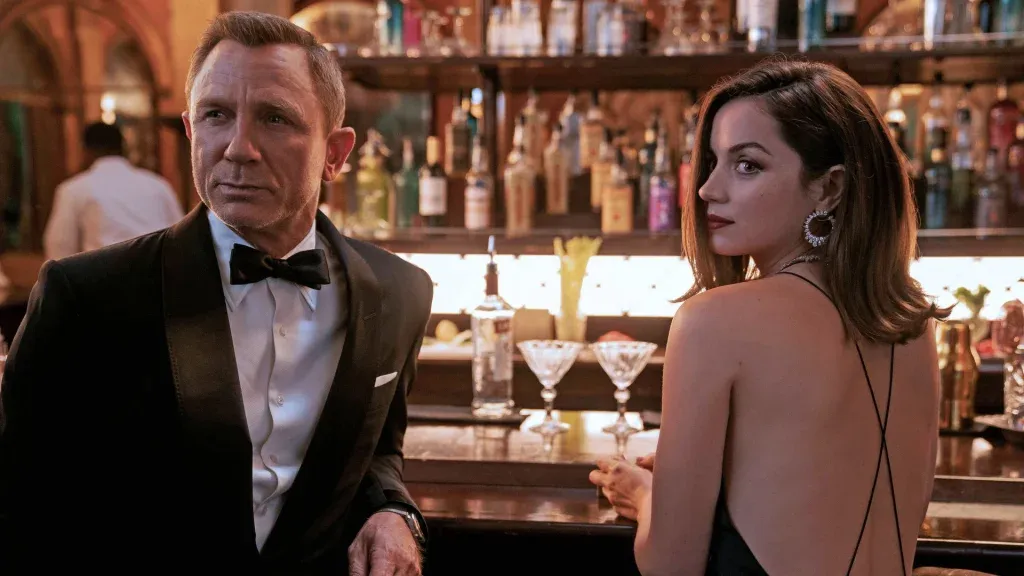
They’ve never killed him before at the changing of the guard. It was always just a reset: mechanical, unemotional; fandom whinging aside. But this time, we are allowed to mourn. We are supposed to mourn. It would have been a hell of a ride, emotionally, to say goodbye after fifteen years, anyhow. But with this, with James choosing the lives of his family — his family — over his own; dying a hero’s farewell, it’s more than that. And even as there was certainly a sense of Daniel Craig being given the chance to say his goodbyes, it never felt self-indulgent. His ending felt earned. And it felt right to kill the character, to have him make the ultimate sacrifice that he’s never had to make before, because consequences were never part of his DNA. We already had him riding off into the sunset at the end of Spectre. While I will forever mourn that he never got to drive along that winding mountain road with his partner and daughter, it would have been too easy. And it wouldn’t have been a true ending. For the first time that James Bond actually had feelings, it makes sense to give him a real, human ending. And that’s not resurrection. That’s death. And for us, catharsis.
We were with him from the beginning of his career to the end of his life. We watched him attain double-0 status, we watched him kill for the first (and the second) time. We watched him fall in love, we watched him be betrayed, we watched him struggle to trust again. We watched him find a team at MI-6 and a home in London, the city that has been so integral to these movies as it’d never been before; we watched him lose but still come out on top, even if just barely. And now, he’s gone.
This death means that the Bond franchise officially has to open up the multiverse. They can totally do this: just introduce a new actor. They don’t even have to explain anything, just give us a new James Bond, if they so wish, and give us a bit of backstory on what his deal is. Say, “What if?” and reinvent him again.
But this loss means that the audience, too, needs time to adjust. Daniel Craig’s act will be tough to follow, literally. He’s left big shoes to fill. His James Bond was unique in so many ways — so what are they going to do with another one? Adjust his backstory, redefine his character? Wipe the slate clean again, reboot? Cycle out the supporting cast as well? They managed with this SPECTRE plot line what the Brosnan movies perhaps were too early out the gate for: leave the Cold War behind, and figure out the new landscape. It's not foreign governments and intelligence agencies that are the enemy anymore (and we can thank our lucky stars that they never went the Call of Duty route and set every Bond movie henceforth in the Middle East; never mind that with a British spy and the sheer reach of colonialism and imperialism, the notions of that will never go away). Instead, the enemy has vanished into the shadows, infiltrating any organisation and government they so choose. Corruption and greed are the new enemy now.
This was the send-off that Daniel Craig deserved, and this evolution over five movies has finally opened up the Bond franchise to true storytelling. There are a lot of choices coming up for Barbara Broccoli and Michael Wilson. And I hope that they take their time making them, and not let themselves be rushed into a decision. Let them figure it out.
And let us grieve. Commander James Bond, blunt instrument, killer, agent provocateur. And a half decent man.

